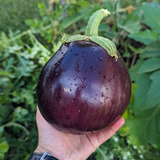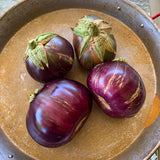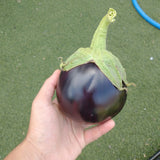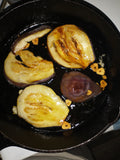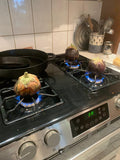Aswad Eggplant (Iraq)
Solanum melongena
Aswad eggplant is an Iraqi heirloom variety native to the land of ancient Mesopotamia and modern-day Iraq. Aswad, the Arabic word for 'black', is a colloquial term for eggplant in Iraq. Aswad has a distinct teardrop shape and deep purple skin. Aswad produces high yields and is drought tolerant. Aswad's drier fruit makes it especially suited for frying and baking in Iraqi dishes, but can be used like any Italian eggplant varieties.
Aswad was first introduced in the U.S. in the 90s by Iraqi seed saver Aziz Nael. The seeds offered in this catalog were cultivated in Los Angeles, CA by Rivka-Suad of the Iraqi Seed Collective, a group of diasporic people of Mesopotamian heritage who are saving seeds to uplift and preserve ancient culture from the fertile crescent. Plants tend to produce high yields and are heat tolerant. This variety pairs well with all forms of cooking methods and is especially suited for frying and baking in Iraqi dishes. 10% of the sale of this seed goes to the Iraqi Seed Collective.
Days to maturity: 85
Seeds per pack: 40-45
Germination rate: 84% on 12/23/2025
Planting / harvesting notes
Sow seeds indoors 8-12 weeks before the last frost and transplant into the garden well after the danger of frost. 1/4 inch deep. Keep seedlings moist but do not overwater. Transplants should be initially watered in well, and plants will be most productive with regular irrigation and full sun.
Seed keeping notes
Eggplants are generally self-pollinating, though we isolate different varieties of the same species by 300 feet, in hopes that flying insects will not cross pollinate them unexpectedly. Eggplant seeds are ripe when the fruits get far past their edible stage, and have turned another color, in this case a duller, lighter purple. Cut the fruit, scrape out seeds (perhaps through a heavy-duty screen) into a vessel, add a little water (1-2 inches is probably plenty) to your seeds and pulp to keep them from drying out, and allow them to ferment away from direct sunlight. Fermentation is not necessary with eggplants, but it makes seed cleaning a bit easier. Ideally, you will stir the concoction every day for 3-5 days. In the end, add more water to fill the vessel, stir one final time, and allow to settle. Pour off the floating material and then strain the seeds through a strainer. Sometimes, you will need to add more water and pour off the floating material several times until the water is clear and you can see the seeds sunken at the bottom. Squeeze dry the strained seeds in a towel, and then lay out to dry on a labeled screen or paper product in a ventilated place away from direct sunlight for a week or two.






